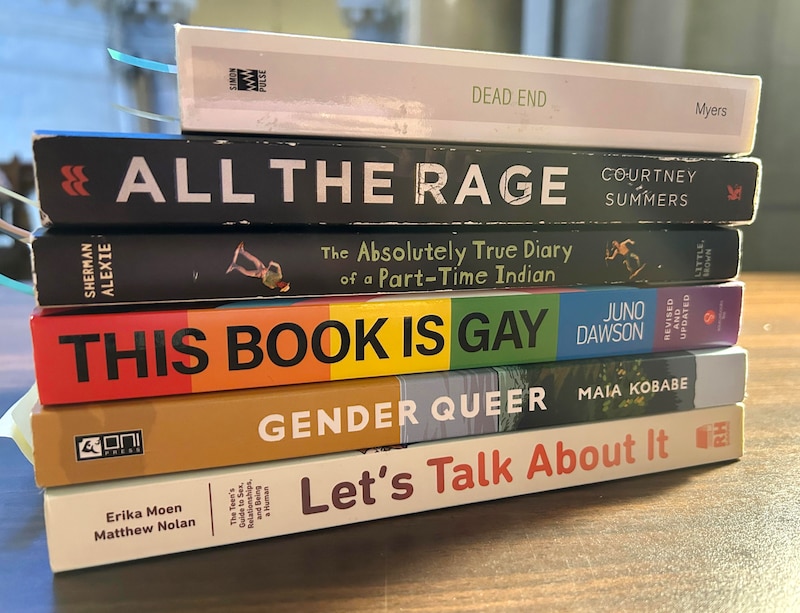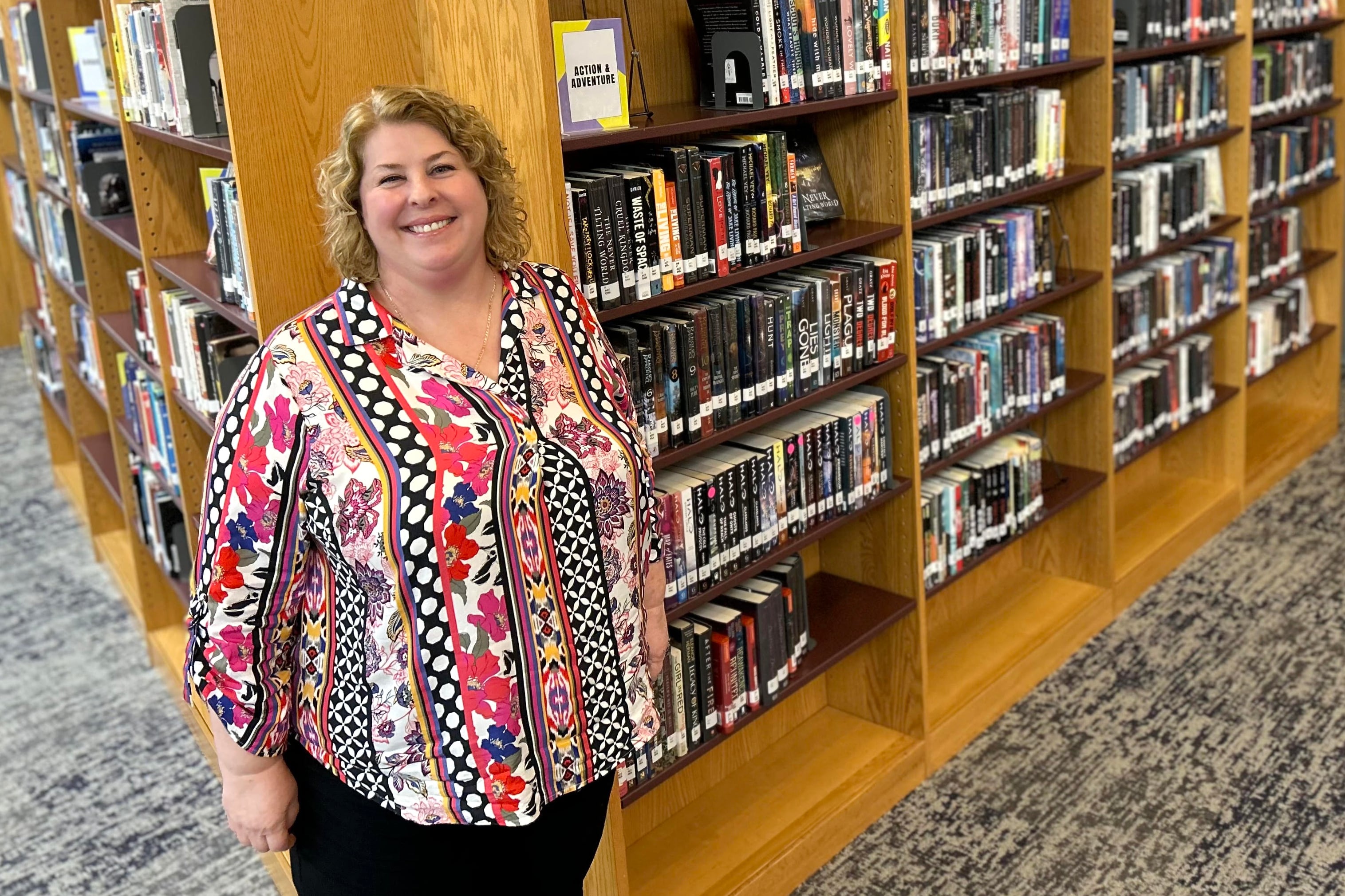Sign up for Chalkbeat Indiana’s free daily newsletter to keep up with Indianapolis Public Schools and statewide education news.
“Pornographer.”
That’s the insult Chad Heck remembers, hurled by the people behind him as he testified in the state legislature earlier this year.
Like other Indiana school librarians who spoke against legislation seeking to restrict school bookshelves this session, Heck tried to dispel the notion that he and his colleagues were peddlers of porn — and found himself part of the national culture wars that have pitted some parents who mistrust public education against school leaders and staff.
Ultimately, lawmakers passed a bill that forbids books deemed “obscene” or “harmful to minors” on school library shelves, following hours of heated public comment. House Enrolled Act 1447 also requires school districts to establish procedures to publish their school library catalogs, and to set up a process for a parent or community member to request removal of obscene or harmful material.
Now, Heck and other librarians with the Indiana Library Federation (ILF) who fought against the legislation are learning to live with the law, but they are still trying to clarify misconceptions about it. They stress that the law is not an outright book ban. They also say many districts already post their catalogs online, and already have procedures for challenging books.
School librarians say that contrary to what some might think, they don’t have obscene or harmful material in their collections. Instead, they worry the law will create what amounts to self-censorship among school librarians — who for the past few years have been the target of public scorn and scrutiny over what, exactly, is on their shelves.
“It contributes to this culture of fear that many librarians are operating under, which does have a chilling effect on our collections,” said Heck, the advocacy co-chair of ILF, which has a subgroup known as the Association of Indiana School Library Educators (AISLE). “And I’m concerned about this.”
In his office, Republican Sen. Jim Tomes — who has tried to pass some version of the new law for years — keeps six books he says are examples of pornography in schools. These include “This Book Is Gay” and “Gender Queer,” both of which are among the top 13 most challenged books in the country, according to the American Library Association. Parents across the state, he said, have reported to him that they’ve found these books in school libraries.
Some of the books offer advice for young LGBTQ adults navigating their sexuality, or serve as a sexual education guide for teens. But Tomes, who co-authored a variation of the bill language that eventually became law, says they show that school libraries have a problem.
“This was raw, 100 percent pornography,” he said. “The wording, the stories, and also the pictures in the books, the illustrations. If this is not pornography, then I don’t know what you could call it.”
Backlash against libraries is worst some have seen
Censorship battles in schools have existed for decades and have origins on the political left and right, librarians say.
But school librarians say they’ve seen an increase in concerns over what’s on their shelves in the past three years, as mistrust of public schools grew in the wake of the coronavirus pandemic. And some say the anger they’re facing now is the worst pushback against their profession they’ve ever seen.
The outrage has come from groups such as the Indiana chapter of Purple for Parents, which rails against the dangers of social-emotional learning and critical race theory in the classroom. Like Tomes, Purple for Parents insists that there is porn in Indiana schools.
An Indiana version of the “Mary in the Library” Facebook page, which features passages from what it deems to be “naughty children’s books,” has also escalated the controversy surrounding the issue.
But just as those inflammatory social media posts don’t necessarily tell the whole story, Heck said that people involved in discussions of the new law would “just point out one passage in a book” while missing important context.
While the new law prohibits schools from providing students with material deemed “obscene” or “harmful to minors,” it also requires that the material in question lack serious literary, artistic, political, or scientific value. In addition, the material must be considered as a whole by readers.
Some school librarians say they don’t have materials in their libraries that meet the statutory definitions of material that libraries must pull from their shelves. And the books in Tomes’ office illustrate how differently both sides view the content.
With the exception of one book he was not familiar with — “Dead End” by Jason Myers — Heck argued that none of the books Tomes kept in his office would fit the statutory definition of obscene or harmful to minors.
Among those books, “Let’s Talk About It” is a guide for teens on sex and relationships that has depictions of sexual organs and sex. “This Book Is Gay” bills itself as an instruction manual for young adults trying to understand their sexuality and “what it’s like to grow up LGBTQIA+.”
And “Gender Queer” is a memoir about the author’s journey in identifying as nonbinary and asexual, described on its back cover as a “much-needed, useful, and touching guide.”
Tomes argued that such books are so inappropriate that he refuses to keep them in his house. But Heck countered that those books do so much more than appeal to an interest in sex, and must be read in their entirety to appreciate their intention. They discuss common issues LGBTQ people face, he said.
Librarians also argue that the process of adding materials to their collection requires careful consideration that includes consulting professional sources, like Kirkus Reviews and School Library Journal, to determine what is age-appropriate.
“There’s a lot of thought and effort and time put into having the books in the collection,” said Diane Rogers, vice president of the Indiana Library Federation who’s a librarian at the Ben Davis Ninth Grade Center in the Metropolitan School District of Wayne Township. “I don’t purchase books on a whim, just like I won’t remove books on a whim.”
But as challenges to books and school libraries have intensified, critics of laws like Indiana’s have worried that groups will target books serving underserved communities — such as LGBTQ youth — for censorship or restrictions, increasing those students’ feeling of isolation.
“Right now, I am more concerned about librarians removing materials that meet the needs of our communities because they’re worried about backlash, or worried about being personally attacked,” Heck said. “And that is having a huge impact on libraries in our state.”

And even though the text of the law targets books that lack artistic or other merits, the prospect of ongoing and intense arguments over what is actually “obscene” or “harmful to minors” has some librarians worried that their colleagues may start preemptively pulling material from their shelves just to avoid a fight.
“There are people who are asking themselves: Is it worth it for me?” said Rogers. “There’s librarians who are asking questions because their administration is coming to them and asking them to pull certain titles, you know, usually in an abundance of caution.”
Librarian leaders hope focus can return to kids
Just how much the law will change school districts’ handling of book challenges may vary when it takes effect Jan. 1.
In Marion County, at least three of the 11 school districts told Chalkbeat they already have some sort of procedure for challenging books or requesting that they be removed. Those include Wayne, Perry, and Indianapolis Public Schools.
The new law requires school districts to hear requests to remove materials during public school board meetings. At least six of the 11 Marion County districts told Chalkbeat that they did not receive any formal challenges to books in the past year.
Tomes did not say whether he had personally seen the books that he keeps in his office in schools; he stressed that parents reported to him that these books were in school libraries. He said it’s great that some school districts and librarians already comply with parts of the new law.
“I’m glad that they are already doing that,” he said. “Not everybody was.”
The law also tweaked the various defenses individuals can claim as protection from prosecution for disseminating material harmful to minors — classified as a felony under state law.
The new law removes the previous defenses that allowed sharing such material if it was done for an educational purpose or shared by a school. However, librarians with ILF and the Indiana State Library maintain that school employees can still claim a defense from prosecution under the law if they are acting within the scope of their employment.
“Whether or not this is intentional or will be changed in some sort of future clean-up action remains to be seen,” the Indiana State Library said in a legal memo it sent to school libraries in May.
As school districts statewide adapt to the new law, librarians with ILF are urging colleagues to lean on each other and embrace a collection method informed by research and professional book reviews.
Mainly, though, they hope the intense public scrutiny aimed at them in recent years will soon end.
“I’m hoping that this is just a storm that we’ll be able to weather, and it’ll pass,” said Emily Wilt, chair of the AISLE group. “And we’ll be able to turn our attentions and our energies more fully back toward the reasons we all got into this profession, which [is] serving our kids.”
Amelia Pak-Harvey covers Indianapolis and Marion County schools for Chalkbeat Indiana. Contact Amelia at apak-harvey@chalkbeat.org.





